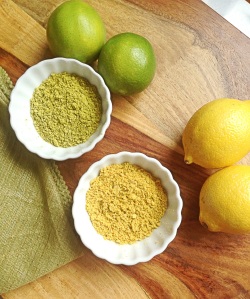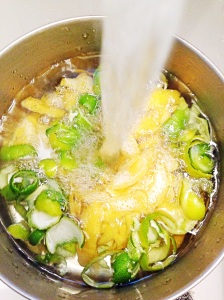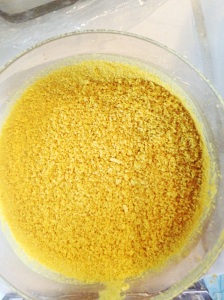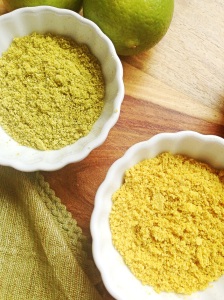Several month’s ago I read an article in Bon Appetite Magazine about how the chef at State Bird Provisions was using sour salts to brighten up dishes, and make use of an ingredients that would otherwise not get used. His approach was simple, dehydrate something as simple as a preserved lemon, grind it into a powder, and boom you’ve created a flavorful salt without even trying. After reading that article, I knew that I wanted to try making a preserved lemon salt. I put it on my list of things to blog about, but never got around to it–it has been almost a year since I read that article! I had almost forgotten about wanting to do a preserved lemon salt until last week, my husband and I went out to eat. I ordered a Caesar salad, and when they brought it out, it looked completely under dressed, almost like they had forgotten to put the salad dressing on it. I took a bite thinking it was going to be a bland salad, but instead got this bright burst of flavor. The chef had dusted the salad with lemon zest. The salad was fantastic! Even better than my Caesar Salad. I knew then that I had to try this at home. It wasn’t until I read a review for the soon to be released cookbook Bar Tartine: Techniques and Recipes that I got the idea about exactly how I could do it, but even better. Lemon zest is great but it’s not exactly shelf stable. If you’re going to use it, you definitely have to use it right away. But if you take the peels of a lemon, lime, or even an orange, dry them in the dehydrator, and then blend them into a powder, what you get is something extremely flavorful, and shelf stable. You also have a way to use leftover peels! I don’t know about you, but I hate to waste, so anything that allows me to preserve, rather than waste, I love. So you’re probably wondering, besides a salad, what you use these powders on. The answer is almost anything! You can sprinkle the lemon, or lime powder on chicken, fish, pork or steak to give it a fresh and vibrant twist. You can add these citrus powders to baked goods, rim your tequila glasses with them, add them with some other dry spices to make a citrus rub, (stay tuned for that post), make citrus salts, the list goes on and on. If you make enough of these powders, you can even give them as gifts for Christmas. I for one am doing a lemon pepper for my friends. Bar Tartine: Techniques and Recipes hasn’t been release yet, but I’ve already pre-ordered a copy through Amazon. It’s full of recipes for dehydrating and powdering everything from herbs, to yogurt. Yes you can even dehydrate yogurt! I suppose it’s not such a leap to know that you can dry yogurt, especially given the fact that powdered milk and cheese are products that you can buy in most grocery stores. However, the thought of being able to use my dehydrator to make my own powdered yogurt and herbs excites me!
Prep time: 10 minutes
Drying time: 1.5 hours-2 hours
Ingredients:
The peels from 2 lbs of organic citrus –I used lemon, lime
Directions: Pre-heat oven to 150F if using an oven. If using a dehydrator set it to 135F. Using a vegetable peeler peel the skin off of the citrus.
Add the citrus to a pot, add enough cold water to cover all of the citrus and bring to a boil—let boil for 1 minute. Drain peels into a sieve and rinse under cold water. Return back to the pot and repeat: boil ,drain, and rinse twice more.
Spread the peels out evenly onto your dehydrator sheets. If using a stove, spread the peels over a wire rack set inside of a bake sheet.
Bake or dehydrate until peels are hard and brittle, it took about 1.5 hours in my dehydrator. Once peels are hard and crisp, transfer to a spice mill
Grind until powdery, transfer the powder to an air tight container.
OMG! The smell of these powders while you are grinding –AMAZING!!!! If you like this recipe you will love my recipe for DIY Ground Ginger–How to make Powdered Ginger








May I ask why you have to boil the peels three times before dying? It seems like you would retain more essential oils by omitting that step.
Hello A Ardoin,
Yes you could omit this step, but the point of boiling and then quick cooling the peels is to rid the peel of the bitter compounds that come from the pith. A alternative option to doing this would be to use a fine grater to remove only the zest–you could dry directly from that if you’re concerned about the loss of essential oils. I find that way too time consuming, so I do it this way. I haven’t noticed a loss of essential oils–I suspect it’s because the peels aren’t heated long enough. Thank you for taking the time to comment. If you make this let me know how it turns out.
How long can this be stored for? Do you know how long powdered ginger and garlic can be stored for too? I know cayenne pepper powder can be stored for 8 months….. Trying to make my own matcha tea bags for weight loss/detox and want to see how long I can store them for.
6 months minimum at room temperature, keep them in an air tight container in a dark cupboard and they will keep for much longer. Freeze, and they can store indefinitely–but if I were going to freeze them I’d definitely seal them with a food saver first. This applies to powdered ginger and garlic as well. I have a recipe for ginger powder here: https://lazygirldinners.com/2014/10/28/d-i-y-ground-ginger-how-to-make-powdered-ginger/
Thank you very much!
do you know if you can make vinegar out of ginger,cayenne pepper,garlic, and lemons?
and if so do they still hold the health benefits?
V/R
Kyle
You can, but lemon vinegar is something that you need to baby–it can go from great to bad in just a couple of hours. But it can be done. So unlike a wine vinegar–which you can let sit for weeks before checking it–you really need to check a lemon vinegar daily sometimes multiple times a day once it begins to bubble. The health benefits are great in vinegar–it’s a fermentation–so you gain many added benefits from fermenting.
Hello again
I brew bear,mead, and wine…. mostly mead and wine right now.I have about 45 gallons going now of cherry and cranberry wine.
I have done a pink grapefruit champagne.
So I am thinking the conditions would be the same with lemons except the fact of not locking the the air out and the fact of not using a controlled yeast.
What exactly do you mean I would have to watch it? and if it does turn into vinegar does it have the same shelf life as of ACV? and would I still need to watch it? or is that it has a high possibility of turning bad in the fermentation to ethanol and into vinegar process?
I want to thank you again for your knowledge and for answering my questions outside of the pages topic, it is very much appreciated.
V/R
Kyle Rosario
You’re ahead of the game if you’re already making meads, and you’re probably much more experienced in making vinegars than I am. Grapefruit champagne sounds amazing😄! Let me know how that turns out and share the recipe if you have one! When I say babysit lemon vinegar it is because it has a tendency to turn extremely bitter. So once it starts to bubble and ferment you just need to start tasting it, so that it doesn’t become too bitter.
Good evening Lazy
I have actually not made vinegar before this batch.
in which I have even more questions now that I have started….
I started two different batches one being the normal cut up apples and mix in sugar water, which is starting to ferment into ethanol now being a week in.
and then the other being blended apples with sugar water and braggs ACV.
1 part braggs to 1 part apple blend mix. this is supposed to be a faster way skipping the whole fermenting into and from ethanol.
so again being a week in I have two mother paddies, real small, and two because i accidentally moved the jar and the first one went to the bottom, and now a second one is growing.
my issue with this one is that it does not smell like vinegar. it smells weird.
it smelled like ACV the first couple days, but once the mother formed it just has a funky smell.
is this normal? will it get the ACV smell later? should i throw it out and try with apple juice like the instruction said to?(lol)
V/R
Kyle Rosario
Sorry I just caught this, I can’t say since I’m not there to smell what you’re smelling. You could always just taste it. Sometimes ferments just smell. Since I’m not sure what you’re smelling, I’d say wait, taste, and then decide.
When you say add the citrus to the pot are you meaning the peeling and the fruit or just the peels?
Just the peels
Thanks for the recipe, what would happen if you dehydrated the actually fruit? And if it is no good what use do you find for all that juice? Thanks
You could dry the entire fruit just slice and make citrus rings. The result would be a delicious way to preserve your citrus. You could use it in the same way you use this powder.
would you still have trouble with the bitter taste of the pith? I like the idea of slicing the whole lemon and dehydrating those, let me know your from your experience. I think I’m really lazy
Yes there is a bit of bitterness that comes with leaving the pith in.
Why do you have to cook the peels first? Can’t you just dehydrate then straight after you peel them?
You can skip that step if you like. It is not a requirement. It is done in order to eliminate bitterness. However, if you’re really careful about avoiding the pith when you remove the peel you will not have that to contend with, also many people have no problem with, good luck and thanks for commenting.
I saw a recipe calling for pineapple powder – which I cannot find. Do you think you can use this process with pineapple? What part would you use?
Interesting! I’ve never worked with pineapple powder so I’d have to get some and tinker with it. However, since dehydrating anything condenses it I’d say start with less than you think you need and add more to taste.
Just a thought, If you can’t find pineapple powder you could dehydrate some pineapple and then powder it in a spice grinder or coffee grinder.